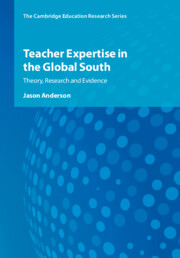Book contents
- Teacher Expertise in the Global South
- Teacher Expertise in the Global South
- Copyright page
- Contents
- Figures
- Tables
- Acknowledgements
- Abbreviations
- 1 Introduction
- 2 The Construct of Teacher Expertise
- 3 The Expert Teacher Prototype
- 4 Effective Teaching in Low-Income Contexts
- 5 Researching Teacher Expertise in the Global South
- 6 A Portrait of Teacher Expertise
- 7 Exploring the Quintain
- 8 Diversity in Expertise
- 9 Teacher Expertise in the Global South
- 10 Updating the Expert Teacher Prototype
- 11 Valuing and Building on Southern Expertise
- 12 Concluding Reflections
- References
- Index
7 - Exploring the Quintain
Expert Indian Secondary Teachers of English
Published online by Cambridge University Press: 18 May 2023
- Teacher Expertise in the Global South
- Teacher Expertise in the Global South
- Copyright page
- Contents
- Figures
- Tables
- Acknowledgements
- Abbreviations
- 1 Introduction
- 2 The Construct of Teacher Expertise
- 3 The Expert Teacher Prototype
- 4 Effective Teaching in Low-Income Contexts
- 5 Researching Teacher Expertise in the Global South
- 6 A Portrait of Teacher Expertise
- 7 Exploring the Quintain
- 8 Diversity in Expertise
- 9 Teacher Expertise in the Global South
- 10 Updating the Expert Teacher Prototype
- 11 Valuing and Building on Southern Expertise
- 12 Concluding Reflections
- References
- Index
Summary
This chapter offers a detailed description of important similarities and shared features among the eight teacher participants in the case study, discussing these commonalities as both a ‘quintain’ (Stake, 2006) and a ‘prototype’ (Sternberg & Horvath, 1995) of Indian secondary teacher expertise, offering extensive extracts from lessons and interviews to do so. It covers the participant teachers’ beliefs about teaching and learning, their interpersonal practices, their languaging practices, how they managed their curriculum, prepared resources and planned lessons before offering a detailed description of aspects of their classroom practice, including lesson structuring, negotiation and improvisation, whole class teaching, learner-independent activities, teacher active monitoring of learners, assessment and feedback practices. Evidence is also provided on commonalities concerning their knowledge base, reflective practices and professionalism. The chapter closes by offering a number of brief examples that serve to relate the practices and cognition of these teachers to the contextual constraints, challenges and affordances typically experienced by teachers working in the global South.
Keywords
- Type
- Chapter
- Information
- Teacher Expertise in the Global SouthTheory, Research and Evidence, pp. 119 - 162Publisher: Cambridge University PressPrint publication year: 2023

